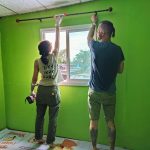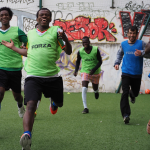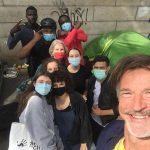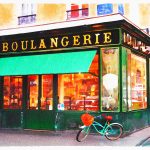by Mary McColley, Serve the City Paris
The sky wears a grey mantle of clouds and the sidewalk is tracked with the black aftermath of rain as I walk towards la Caféothèque, rue de l’Hôtel de ville. Even through my mask, I can smell the deep, heady scent of coffee beans emanating from the door of the café’s light façade. Wicker chairs with cross-hatched backs sit empty and inviting below green awnings, but I turn to cross the street, away from the café, to where a throng of people stand gathered. A hum of conversation drifts through the Saturday morning. Thermoses sit on tabletops in splotches of bright green, and worn Carrefour sacks brim with wrapped sandwiches.
Serve the City: where, on Tuesdays and Fridays, 9h, and Saturdays at 10h, people come together to serve. It’s a hardy band of volunteers from an ever-shifting mélange of nationalities. The conversation becomes a mixture of languages; every week is a different permutation of volunteers and passports. There’s a lot of expat info and tales of visa woes that go around. Some are refugees, some students, some Parisiens born and raised. But in whatever weather it may be, at the Caféothèque, we gather. With leftover food collected from Prêt à manger and the tinfoil-wrapped contributions of the American Church of Paris, we walk the streets. We approach the people in sleeping bags, the people so easily avoided who hold out small paper cups of need; we stop where others walk past; we make a Samaritan effort.
I see a few familiar faces this morning. After a period of socialization and some group photos, I fill my bag with food and set off with a group of a half-dozen others towards the quai de la Rapée. The route tracks the berges of the Seine, into an ill-lit tunnel and up towards a riverside corner where men are invariably gathered, sitting or smoking in worn chairs. As we see person after person, we stop and offer something, to meet what needs we can. Coffee, a sandwich, a salad; a conversation. It is a familiar rhythm to me now. « Y a quelqu’un ? » I call outside of closed tents. « Bonjour, monsieur. »
It is not always idyllic; I never know exactly what I will encounter. I listen politely to stories of vast wealth found in trash cans from a man who finishes by looking down at his feet, bare against the dark tunnel cement, and asks me if I have a pair of socks. Below the pont d’Austerlitz, with the lingering rancor of last night’s dispute over a cell phone, I see one man beat another with the broken handle of a broom, and I shift away, instinctively nervous at the violence. A third guy rises from his seat to pull the weapon away. « S’il te plaît, ne frappe pas ! » he says, with a sort of tired resignation in his voice; he is used to the volatile dynamic beneath the bridges. I see another man, a regular, with an extremely swollen cheek and ask him about the tooth I know has been hurting him recently. With an understated voice, he tells me he has just had a dental operation and can’t eat anything hard for the next six weeks. I notice he is sipping coffee but didn’t take a sandwich. This same man recently had a broken bone in his leg. I reflect that in France, the life expectancy of an SDF — someone who sleeps rough, who lives on the street; quelqu’un sans domicile fixée — is only 47. Medical and food access are difficult to obtain; the lack is a deadly combination.
But there is sunlight gleaming in the sky from the direction of the Gare d’Austerlitz , illuminating clouds that have become brilliant mountain ranges, white as the flight of birds. We set up some coffee and sandwiches on the bank outside of a series of tents and invite the men there out from behind the metal grill. One by one, they come to sit on the bank, to take something, to talk. One twirls a hand-rolled cigarette in his fingers and smiles, a wide, broken-toothed smile, as he lists off the people he knows. He gestures towards each one: « Je connais Marie, je connais Carole, je connais Peter et cet homme ici, » saying something that sounds more like « Shazam » than « Shahram. » I can see how much pleasure it gives him to know us, individually; to see the same faces week after week. A few guys try out Wolof phrases on me and seem disappointed that I have not miraculously become fluent since last week. Another wants to hug us. « Merci, hein, » I hear, repeated.
In Antoine St-Exupéry’s small book Le petit prince, a young boy from Asteroid B612 lands on Earth in his travels, and meets a wild fox on a green hillside. The fox begins to talk to him, mentioning the word apprivoiser, and asks the little prince if he is looking for chickens.
– Non, dit le petit prince. Je cherche des amis. Qu’est-ce que signifie « apprivoiser » ?
– C’est une chose trop oubliée, dit le renard. Ça signifie « créer des liens… »
« Créer les liens. » To make connections, to find something humane and human in common between people, no matter how disparate their life situations may seem superficially. Paris is a city filled with the glitter of lights and wealth, and the shadows of despair and poverty. What to do in the face of need? I feel overwhelmed and inadequate when I see the many, many SDFs of this city I live in. Perhaps the best I can do is to try to créer les liens.
Our volunteer efforts in Serve the City are not perfect. Sometimes groups are too large, all thronging round a newly-woken person in an overwhelming swarm of goodwill. Sometimes volunteers are anxious or uncertain and merely shove food at people, not taking the time to make more of a conversation or connection. Sometimes our simple offers are spurned, violently, with shouting and hostility. Certain people on the streets are incredibly wary; I can only try to imagine how much they have lived and how often they have been hurt and deceived to create such mistrust. But as I come back every week, I have to believe that there is worth in trying. Our imperfect efforts reach towards a goal of basic human relationship, dignity, and care. In some instances, we get it wrong; on occasion, our kindnesses are maladroit. But the effort has an earnest beauty to it, and a desire for something better, for some practical, tiny, social change.
So we volunteer. So we dodge puddles; we walk over a grey and swirling river; we mount on sidewalk ledges and hold animated conversations on everything from rabbits to socks to Singapore. We’re just handing out sandwiches, but we’re doing something more, too.
And when we leave the bridges and corners and tunnels, we don’t say « au revoir. » We say « à la prochaine. »







